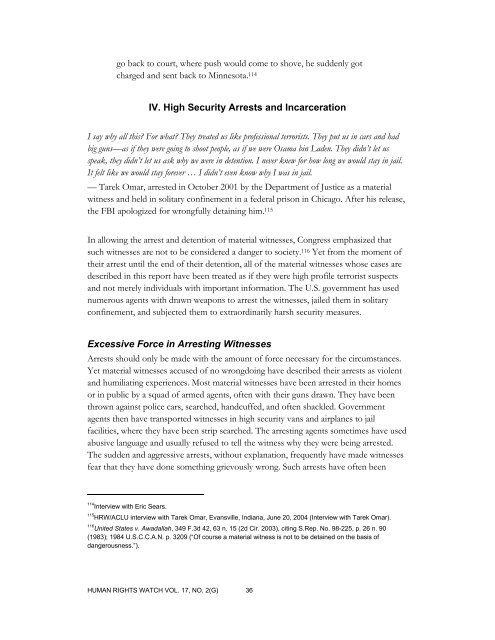Witness to Abuse - Human Rights Watch
Witness to Abuse - Human Rights Watch
Witness to Abuse - Human Rights Watch
You also want an ePaper? Increase the reach of your titles
YUMPU automatically turns print PDFs into web optimized ePapers that Google loves.
go back <strong>to</strong> court, where push would come <strong>to</strong> shove, he suddenly got<br />
charged and sent back <strong>to</strong> Minnesota. 114<br />
IV. High Security Arrests and Incarceration<br />
I say why all this? For what? They treated us like professional terrorists. They put us in cars and had<br />
big guns—as if they were going <strong>to</strong> shoot people, as if we were Osama bin Laden. They didn’t let us<br />
speak, they didn’t let us ask why we were in detention. I never knew for how long we would stay in jail.<br />
It felt like we would stay forever … I didn’t even know why I was in jail.<br />
— Tarek Omar, arrested in Oc<strong>to</strong>ber 2001 by the Department of Justice as a material<br />
witness and held in solitary confinement in a federal prison in Chicago. After his release,<br />
the FBI apologized for wrongfully detaining him. 115<br />
In allowing the arrest and detention of material witnesses, Congress emphasized that<br />
such witnesses are not <strong>to</strong> be considered a danger <strong>to</strong> society. 116 Yet from the moment of<br />
their arrest until the end of their detention, all of the material witnesses whose cases are<br />
described in this report have been treated as if they were high profile terrorist suspects<br />
and not merely individuals with important information. The U.S. government has used<br />
numerous agents with drawn weapons <strong>to</strong> arrest the witnesses, jailed them in solitary<br />
confinement, and subjected them <strong>to</strong> extraordinarily harsh security measures.<br />
Excessive Force in Arresting <strong>Witness</strong>es<br />
Arrests should only be made with the amount of force necessary for the circumstances.<br />
Yet material witnesses accused of no wrongdoing have described their arrests as violent<br />
and humiliating experiences. Most material witnesses have been arrested in their homes<br />
or in public by a squad of armed agents, often with their guns drawn. They have been<br />
thrown against police cars, searched, handcuffed, and often shackled. Government<br />
agents then have transported witnesses in high security vans and airplanes <strong>to</strong> jail<br />
facilities, where they have been strip searched. The arresting agents sometimes have used<br />
abusive language and usually refused <strong>to</strong> tell the witness why they were being arrested.<br />
The sudden and aggressive arrests, without explanation, frequently have made witnesses<br />
fear that they have done something grievously wrong. Such arrests have often been<br />
114<br />
Interview with Eric Sears.<br />
115<br />
HRW/ACLU interview with Tarek Omar, Evansville, Indiana, June 20, 2004 (Interview with Tarek Omar).<br />
116<br />
United States v. Awadallah, 349 F.3d 42, 63 n. 15 (2d Cir. 2003), citing S.Rep. No. 98-225, p. 26 n. 90<br />
(1983); 1984 U.S.C.C.A.N. p. 3209 (“Of course a material witness is not <strong>to</strong> be detained on the basis of<br />
dangerousness.”).<br />
HUMAN RIGHTS WATCH VOL. 17, NO. 2(G) 36
















